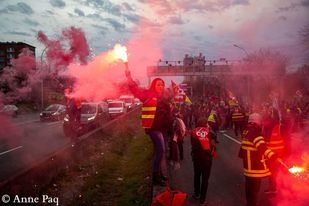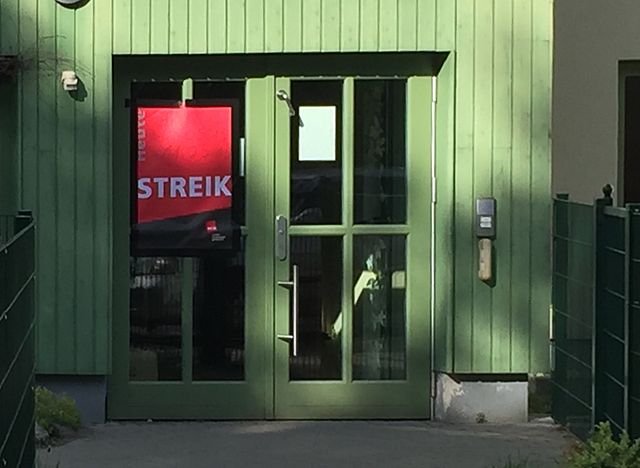President Emmanuel Macron suffered a significant political defeat on Thursday 16th March. Having spent his last few days begging MPs from the traditional right-wing Republican Party to abstain rather than vote against his pensions bill, he had to decide at the last moment to impose the bill by decree, thus avoiding a parliamentary vote he would have lost. Macron is 39 short of an overall majority in the National Assembly, but has usually been able to count on the 61 Republican MPs. Not this time.
The Republicans are just as much enemies of workers as is Macron, but under the pressure of the millions on the streets or on strike, in particular the massive mobilizations in medium-sized “conservative” towns, around half the Republican MPs made it clear that they were planning to vote against the bill. After the decree, the bill is now set to become law, unless the lower house of the parliament decides on Monday to pass a motion of no confidence in the government and in Prime Minister Borne. Such a move would no doubt lead to new parliamentary elections.
On the announcement of the decree on Thursday afternoon (the “forty nine-three”, named after the clause in the French constitution which allows parliament to be overruled in this way), spontaneous demonstrations broke out in a dozen cities across France. In Paris, a couple of hundred yards from parliament, thousands gathered. The police soon attacked them with water cannon. Protesters set up barricades with burning refuse bins. In one town “ Fuck the 49.3” was spelt out on the road… in cobble stones, the symbol of the social explosion of May 1968. In another, a huge graffiti warned “ The shadow of the guillotine is on its way”. In parliament, Prime Minister Elizabeth Borne was unable to make herself heard, as Left MPs drowned her out singing the Marseillaise, “ To arms, citizens!”
On Friday morning, motorways were blockaded in Paris, Chambéry, Perpignan, Toulon and elsewhere. Dozens of high schools and universities are also blockaded, including Nanterre, the Sorbonne and Saint Denis. In several places such as Bordeaux, demonstrators are occupying railway lines and stopping trains. The ongoing strikes over the pension issue, among refuse collectors, refinery workers, dockers, energy workers, to mention just some, seem to have hardened. Rubbish is piling up in the streets of Paris and other cities. Meanwhile, energy workers have laid on free electricity to hospitals and other socially useful places.
Disappointingly, public transport is running again after several days of stoppages. In the absence of a clear call for a general strike by national union leaders, workers in some striking sectors felt unable to continue (low wages and high inflation added to the pressure). There have been far more strike funds than is usually the case in this country (the France Insoumise collected 500 000 euros for example), but at present strike funds can only help out the poorest strikers a little. A hundred times more would be useful.
Union alliance
The leaders of the less combative union confederations had more or less planned to wind down the movement once the bill was passed, but the fact that it was forced through by decree has obliged them to stay in the national union alliance of all eight confederations, which is largely conducting the movement. The biggest weakness of this rarely seen alliance has been its solid refusal to call for an open-ended. general strike, instead using ambiguous language such as “Bring France to a halt on Wednesday!” This timidity was partly aimed at keeping less combative unions on board, but it is a risky and damaging strategy, faced with the determination of Macron and his clan.
Even now, instead of calling for a huge mobilization on Monday, the day when a no confidence motion in the government will be debated in parliament, the national union alliance has called for a ninth day of action and strikes next Thursday, 23 March. The movement’s best hope is in the development of the more radical initiatives mostly initiated by rank and file trade unionists and students.
The crisis is showing the differences between the different left organizations. Whereas the France Insoumise, and its leader Jean-Luc Mélenchon, immediately expressed support for the spontaneous demonstrations of anger, and the ongoing strikes and blockades, as did the New Anticapitalist Party and other far left currents, the leader of the Communist Party declared that the main campaign now must be for a referendum on the pensions bill. CP posters calling for a referendum are being flyposted across the country. If one can get the signatures of 185 members of the parliament and the senate, and the signatures of 4.7 million electors, the Constitution allows people to oblige the government to hold a referendum. Although obviously no-one should directly oppose such an idea, it is a serious error to put the emphasis on a constitutional procedure which would take at least nine months, rather than on an insurgent movement right now.
In a revealing comment on Thursday, Macron claimed that pressure from international finance was an important factor in his decision to force the bill, which will push the standard retirement age back two years, through. It is up to us to show international finance and its lackeys that the price will be too high for them, and send out the clear message “We’re not working two years longer!”.




